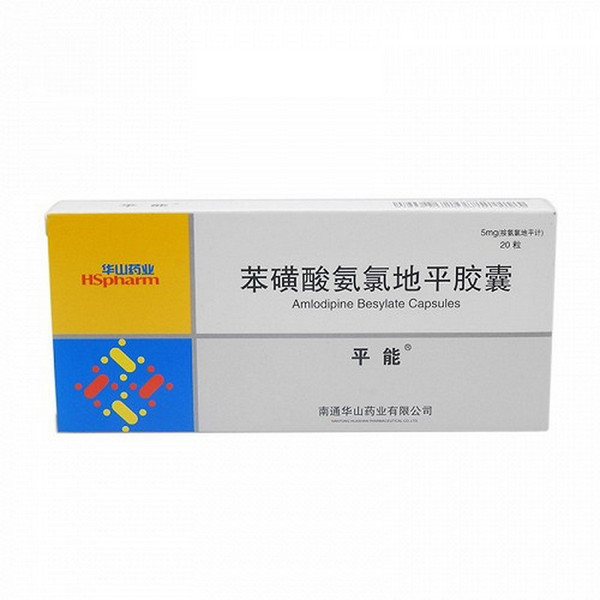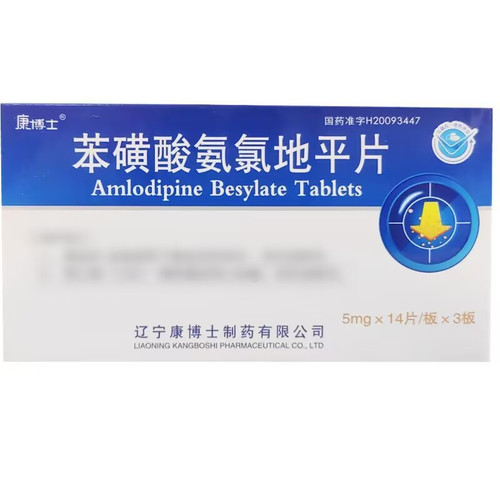Product Overview
[Drug Name]
Generic Name: Amlodipine Besylate Capsules
Trade Name: Pingneng
English Name: Amlodipine Besylate Capsules
Chinese Pinyin: Benhuangsuan Anlvdiping Jiaonang
[Ingredients]
Amlodipine besylate.
[Properties]
This product is a hard capsule containing white or off-white granules or powder.
[Indications]
1. Hypertension. This product can be used alone or in combination with other antihypertensive drugs.
2. Chronic stable angina and variant angina. This product can be used alone or in combination with other antianginal drugs.
[Dosage and Administration]
1. The initial dose for the treatment of hypertension is 5 mg (1 capsule) once daily, with a maximum dose of 10 mg (2 capsules) once daily. For frail or elderly patients, or those with hepatic impairment, the initial dose is 2.5 mg (0.5 tablets) once daily. This dose may also be the dose required to add this medication to other antihypertensive medications. Dose adjustments should be made based on individual patient response. Generally, dose adjustments should be initiated after 7 to 14 days. If clinically necessary, dose adjustments may be initiated sooner, after close observation of the patient.
2. The initial dose for the treatment of angina pectoris is 5 to 10 mg (1 to 2 tablets) once daily. Lower doses are recommended for elderly patients and those with hepatic impairment. The effective dose for most patients is 10 mg (2 tablets) daily.
[Adverse Reactions]
Amlodipine is well tolerated. In placebo-controlled clinical trials for the treatment of hypertension or angina, the most common side effects were: Autonomic nervous system: flushing; General: fatigue; Cardiovascular, general: edema; Central and peripheral nervous system: dizziness, headache; Gastrointestinal: abdominal pain, nausea; Heart rate/rhythm: palpitations; Psychological: drowsiness. No significant clinical laboratory abnormalities related to this product were observed in these clinical trials. Less common post-marketing side effects include: Autonomic nervous system: dry mouth, increased sweating; General: weakness, back pain, malaise, pain, weight gain/loss; Cardiovascular.
[Contraindications]
This product is contraindicated in patients with hypersensitivity to dihydropyridines or any of the ingredients in this product.
[Precautions]
1. Warning: In rare cases, patients, particularly those with severe coronary artery disease, may experience increased frequency, prolonged duration, and/or severity of angina pectoris, or acute myocardial infarction, when initiating or increasing the dose of calcium antagonists. The mechanism of action is currently unknown. 2. Because amlodipine's vasodilatory effect develops gradually, rare cases of acute hypotension have been reported following its use. However, caution should be exercised in patients with severe aortic stenosis when used in combination with other peripheral vasodilators.
3. Use in Patients with Heart Failure: Calcium channel blockers should be used with caution in patients with congestive heart failure. In a long-term, placebo-controlled study (PRAISE-2) in patients with non-ischemic heart failure (NYHA class IV), although the incidence of heart failure exacerbations was not significantly different compared with placebo, there was an increase in reports of amlodipine-related pulmonary edema.
4. Use in Patients with Impaired Hepatic Function: As with all calcium channel blockers, the half-life of amlodipine is prolonged in patients with impaired hepatic function, but a recommended dose has not yet been established. Therefore, caution should be exercised in patients with renal failure.
5. Use in Patients with Renal Failure: Changes in amlodipine plasma concentrations are not correlated with the degree of renal impairment; therefore, a normal dose can be used. This product is not dialyzable.
[Use in Special Populations]
Precautions for Pediatric Use:
No data are available for the use of this drug in children.
Precautions for Pregnancy and Lactation:
There is a lack of research data on the use of this drug in pregnant women. However, based on animal studies, this drug should only be used in pregnant women when absolutely necessary. It is unknown whether this drug is excreted in breast milk; lactating women taking this drug should discontinue breastfeeding.
Precautions for Elderly Patients:
The time to peak amlodipine plasma concentration is similar in elderly and younger patients. Increased area under the curve (AUC) and prolonged elimination half-life in elderly patients tend to reduce the elimination rate. Elderly patients have been reported to tolerate similar doses of amlodipine as well as younger patients. Therefore, elderly patients can use the normal dose. However, it is advisable to start with a lower dose and then gradually increase the dose.
Drug Interactions: This product is safe for co-administration with the following medications: thiazide diuretics, alpha-adrenergic receptor blockers, beta-adrenergic receptor blockers, angiotensin-converting enzyme inhibitors, long-acting nitrates, sublingual nitroglycerin, nonsteroidal anti-inflammatory drugs, antibiotics, and oral hypoglycemic agents. In vitro data using human plasma indicate that this product does not affect the plasma protein binding of digoxin, phenytoin, warfarin, or indomethacin. Effects of Other Drugs on Amlodipine: Cimetidine: Co-administration with cimetidine did not alter the pharmacokinetics of amlodipine. Grapefruit Juice: Concomitant administration of 240 ml of grapefruit juice and 10 mg of amlodipine to 20 healthy volunteers did not significantly affect the pharmacokinetics of amlodipine. Aluminum/Magnesium (Antacids): Concomitant administration of aluminum/magnesium antacids with a single dose of amlodipine did not significantly affect the pharmacokinetics of amlodipine. Sildenafil (Viagra): A single 100 mg dose of sildenafil did not affect the pharmacokinetics of amlodipine in patients with essential hypertension. When used together, each drug exerts its antihypertensive effect independently. Effects of Amlodipine on Other Drugs: Atorvastatin: Coadministration of 10 mg of amlodipine and 80 mg of atorvastatin did not significantly alter the steady-state pharmacokinetic parameters of atorvastatin. Digoxin: Coadministration of amlodipine and digoxin did not alter plasma digoxin concentrations or renal clearance in normal volunteers. Ethanol: Single or multiple doses of 10 mg of amlodipine had no effect on the pharmacokinetics of ethanol. Warfarin: Coadministration of amlodipine and warfarin did not alter the prothrombin reaction time of warfarin. Cyclosporine: Pharmacokinetic studies have shown that amlodipine does not significantly alter the pharmacokinetics of cyclosporine.
[Pharmacological Action]
Amlodipine is a calcium blocker (also known as a slow-channel blocker or calcium antagonist) that blocks the transmural entry of calcium ions into myocardial and vascular smooth muscle cells. The mechanism of amlodipine's antihypertensive effect is direct relaxation of vascular smooth muscle. The exact mechanism of its angina relief is not fully determined, but it can dilate peripheral arterioles and coronary arteries, reduce total peripheral vascular resistance, relieve coronary artery spasm, lower cardiac afterload, and reduce cardiac energy consumption and oxygen demand, thereby relieving angina.
[Storage] Store in a dark, airtight container.
[Strength] 5 mg (based on amlodipine)
[Packaging Size] 5 mg x 20 capsules
[Expiry Life] 24 months
[Approval Number] National Medicine Standard H20030576
[Manufacturer] Company Name: Nantong Huashan Pharmaceutical Co., Ltd.







